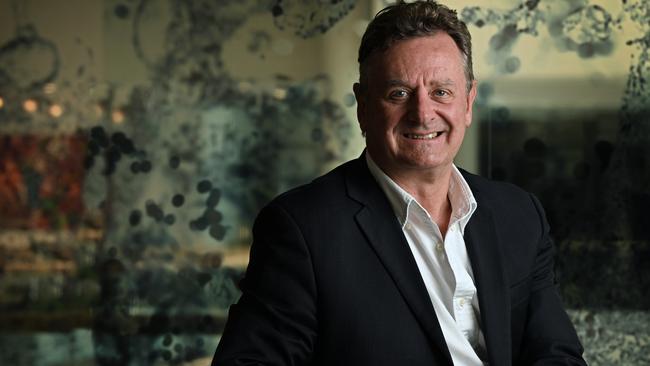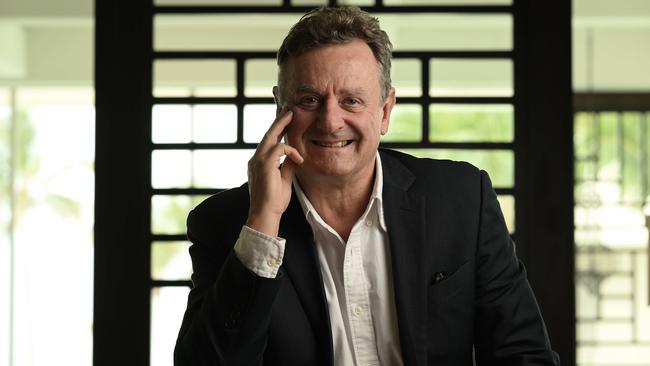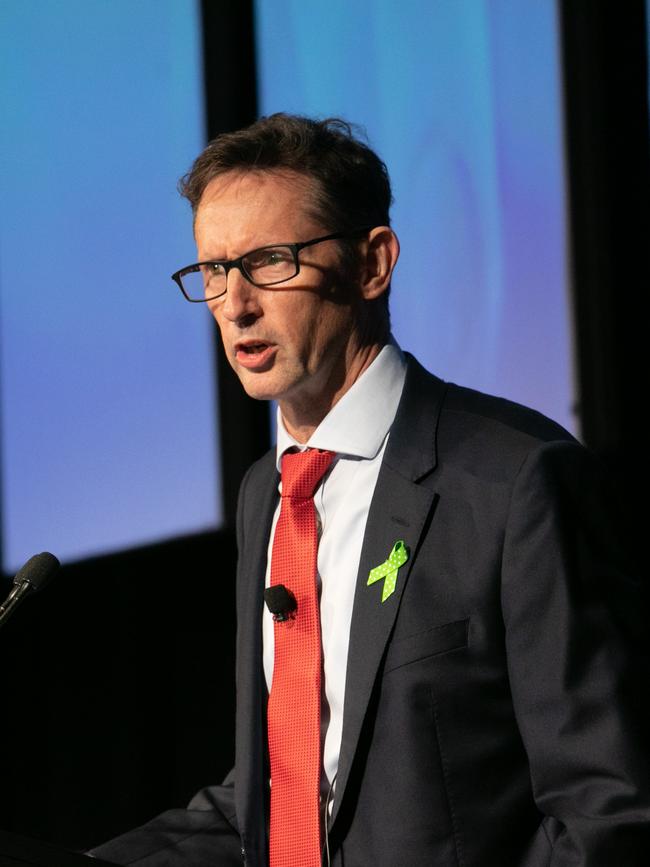Nick Sherry has unfinished business in super
The nation’s first superannuation minister has returned to the industry to tackle the biggest issue facing older Australians today – retirement.

He might not have the international fame of Hollywood actors Henry Cavill, Christopher Reeve and George Reeves, but if Australia was to name its own “Superman”, it could be easily be the moniker given to former federal Senator Nick Sherry.
Sherry was Australia’s first minister for superannuation in 2007 and he subsequently established both the Cooper and Financial Advice inquiries, which ultimately led to the landmark MySuper and Future of Financial Advice reforms.
Since he resigned from parliament in 2012, all of Sherry’s roles in the private sector – including advisory positions with Citi, EY, DWS, Roc Partners and the chairmanship of Household Capital – have been connected to super and retirement income.
Most recently on May 1, Sherry took over the chairmanship of the $6.4bn TWUSuper, the industry super fund for the transport industry and one of the first funds to be created before the introduction of the super guarantee by then Prime Minister Paul Keating in 1992.
Now nearly 30 years on, Sherry says his return to the super system as a trustee has been motivated by the shift in the focus of the super fund movement from the accumulation phase to post-retirement, now known as the “retirement income covenant”.
“It is ironical that it is a retirement system. Yet the last component we are dealing with is the retirement end. It has been a mistake that we have overly focused on the accumulation phase.
Arguably the retirement end is where members have a significant set of additional challenges in life,” Sherry says. “What super funds should be doing there was one of the reasons for me to come back to the system directly.”
Sherry has some strong views that super funds are not only well placed to provide income for people in retirement, but also services.

“There are really complex decisions for people to make around in home care and aged care. Retirement is for 20 to 25 years and there are a whole set of challenges not just on income, but on the service front. Estate requirements, wills, how do you access services and finding quality providers. There is some really interesting work that super funds could be doing to provide wholistic retirement advice,” he says.
“It is early days for funds and the system to be taking this approach. I would hope over the next few years we will see a full package focus emerge.”
The former Minister is clear that super funds should not be providing in-home care services.
“But they can use their scale to get better quality and cost outcomes,” he says.
The Retirement Income Covenant was encapsulated in a bill passed through federal parliament in February this year that requires super trustees to create retirement income strategies that provide more granular detail about how they can assist members in retirement.
The Covenant aims to provide funds with flexibility to design and tailor their strategies to meet the needs of members. The funds need to have formulated their retirement income strategy by July 1.
It comes after the federal government last year revamped the Pension Loans Scheme to help senior Australians fund their retirement by unlocking the value of their home.
The scheme, which was rebranded as the Home Equity Access Scheme, provides non-taxable fortnightly loans using their real estate as security.
Applauding change
Treasury’s Retirement Income Review, released two years ago, found using relatively small portions of home equity through the Pension Loans Scheme or similar equity release products could substantially improve retirement incomes for many people.
Sherry applauds the changes, which have been loudly pushed by the independent specialist retirement funding provider he chairs, Household Capital.
The firm, run by Joshua Funder, is backed by British insurer Legal & General, industry super fund-backed ME Bank, rich-lister barrister Allan Myers, former Macquarie executive Jim Miller and Computer Power founder Roger Allen.
“The total retirement package should include some level of home equity drawdown for some. Because it makes a significant difference to the income outcome,” Sherry says.
“Government can’t pay for everything. Super for Baby Boomers can’t pay for everything. So it is appropriate there is some use of some home equity to improve retirement outcomes.”
Reverse mortgages, where homeowners borrow against equity in their property – typically for short-term reasons – have been heavily scrutinised by regulators.
But Household Capital claims to use sophisticated algorithms to combine a retiree’s home equity, super and age pension to provide a full, long-term picture of a borrower’s financial profile.
“The equity drawdown reverse mortgage framework in Australia is very different to that which existed 10 years ago. It is a strictly regulated product and environment. Whether it is Household Capital or another reputable provider, the regulatory oversight is the strictest in the world. There is a growing awareness of that,” Sherry says, while acknowledging this point is still misunderstood by the wider public.
He believes a priority for the new Labor Minister financial services, Stephen Jones, should be building the partnership between the super sector and infrastructure, especially housing.
“My disappointment is funds haven’t done more in terms of partnership investment in housing, especially social housing. There is an opportunity. You can construct social housing investments that a super fund can invest into,” he says.
He acknowledges the funds do have concerns around the returns from such investments and notes that some like HESTA have already moved into the space.
Bond-like returns
“I have been involved tangentially around disability housing projects in Tasmania. My argument would be you can construct a housing product that will give you a stable bond-like return and the system and funds should be doing more,” he says.

In his pre-parliamentary career, Sherry helped establish the Hostplus Superannuation Fund for hospitality industry workers, now one of the largest industry funds with around $68bn funds under management.
He was also company secretary of the ClubPlus Superannuation fund. Both roles gave him valuable experience in the sector, which he will now draw on at TWUSuper.
The transport industry fund has been involved in merger discussions over the past year, most notably with EISS Super before the deal was put on ice after it was revealed the latter’s community grant program had sponsored a range of entities linked to its now former CEO and his family.
While not wanting to comment directly on TWU Super, Sherry – who has overseen four super fund mergers throughout his career – agrees size and scale in the sector is important and believes that those with less than $2bn under management will not survive. But he has two important caveats.
“Maintaining an industry base and focus is still important,” he says.
“You also need to be careful of the dysfunctional consequences of a very large fund. Scale and complexity can be challenging.”
One of Sherry’s most interesting roles in his life outside politics has been as an advisory board member of Sydney-based agribusiness investment group Roc Partners.
“They have significant investments in agriculture and fishing. For example they own a large part of the Tasmanian oyster industry,” Sherry says.
Roc Partners also has investments in Wagyu beef grower Stone Axe Pastoral, glasshouse tomato business Flavorite, chicken producer ProTen and Made by Cow, a raw milk producer backed by the former boss of Swisse Vitamins Radek Sali and the Bega Cheese-owned Lion Dairy.
Roc has raised capital from super funds including Cbus and Aware Super, as well as wholesale and high net worth investors.
“There is often a critique that super funds aren’t investing in agriculture and the regions, which is simply wrong,” Sherry says before acknowledging that there are challenges for super funds in making big investments in the rural sector.
“One of the issues for super funds is around scale, volatility and market knowledge. Super funds should pay the area more attention but I accept the challenges. If they can’t do it directly, they should look at specialists.”
Many remember Sherry for the shocking headlines in October 1997 when the then Senator was found on the floor of his Canberra flat in a pool of blood, having tried to take his own life.
Sherry, a Tasmanian, had been claiming travel allowances while staying overnight with his mother at Opossum Bay, 49 kilometres from Hobart.
In the days prior he had been ridiculed and humiliated in parliament and the media as the travel rorts affair that cost then prime minister John Howard three ministers reached its zenith.
Sherry’s attempted suicide shocked the nation, yet a similar debate emerged again earlier this year about the rough and tumble of politics when 52-year old first-term Labor senator from Victoria, Kimberley Kitching, died by the side of a suburban Melbourne road after suffering a heart attack. It subsequently emerged she had been allegedly bullied by members from her own party.
Asked about the Kitching affair, Sherry replies: “Politics is a very, very tough and difficult environment at times. Many of us have health challenges from time to time. Beyond that, I don’t get into individual cases or circumstances.”
“I had my events back in 1997, I have talked about them, but in my case I believe I recovered. I stayed in politics and people can judge if I have had an adequate career post politics.”
But Sherry still worries about the culture of politics in Australia, brought to the fore last year by the Brittany Higgins affair.
“The levels of aggression at times I think are inappropriate. I do worry about that. Anthony Albanese has made it very clear that he wants a more balanced cultural approach. We will see what happens,” he says.
“It is evolving but I don’t think it has evolved sufficiently. There has been a series of events affecting individuals over a period of years that has led to a better understanding. But I do think it is a work in progress.”
Sherry today is an active member of his local community in Devonport as chair of Youth,

Family and Community Connections, a not-for-profit drug and alcohol support, accommodation, and family support provider.
He believes there is a far greater understanding in society today of the issues and challenges around mental health.
“But in terms of outcome and change, we are still not there. There is a long way to go to deliver comprehensive solutions,” he says.
Sherry counts himself as fortunate that he was able to chose the timing of his departure from politics in 2012, when his twins were just seven years old.
Others, like former treasurer Josh Frydenberg, were not so lucky after the member for Kooyong lost his seat in the recent election.
Sherry says the last decade working in non-executive roles in the private sector has freed up valuable time to spend more precious moments with his wife Sally and three children.
“The contact with the kids and helping with their schooling has been fantastic. If I look back on the past decade, it has been really satisfying,” Sherry says.
His eldest daughter Miah is now studying medicine at the University of Adelaide. His twins are in year 12 and their father has been teaching them to drive over the past year. Three weeks ago they both got their driver’s licence.
“The twins were born three months premature so their early life that was really challenging. My little girl Sasha only weighed 900g and her twin brother Alex weighed just 1.1kg when they were born,” he says.
“To see them today, to be able to take them driving and seeing them both get their licence, those sort of things bring home how important kids are.”


To join the conversation, please log in. Don't have an account? Register
Join the conversation, you are commenting as Logout